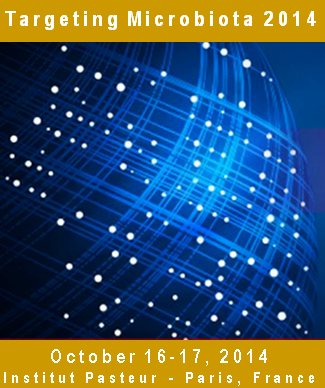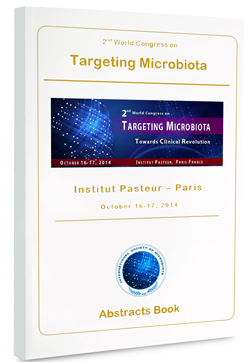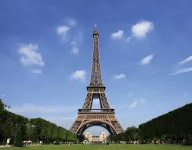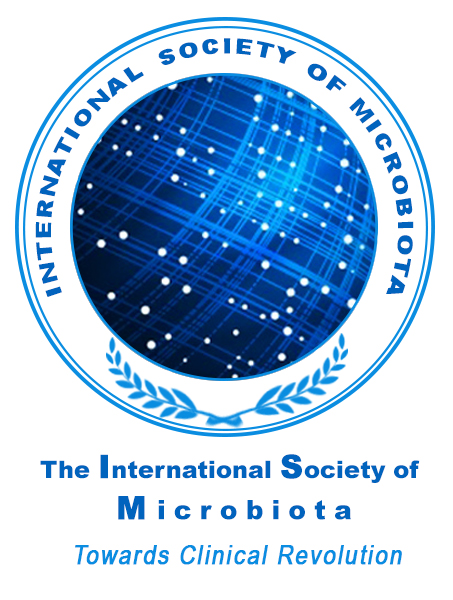 Dear Colleagues,
Dear Colleagues,
It is a pleasure to present you the 2nd World Congress on Targeting Microbiota which will be held in lovely Paris, France on October 16-17, 2014.
Microbiota as the forgotten organ
A large body of evidence show that a diverse population of micro-organisms lives in our skin, mouth, nose, lung and gut, where it plays a strategic role in regulating and possibly controlling human health, well-being, metabolism and diseases.
Microbiotas are maternally transmitted during birth and their composition is influenced by our environment and lifestyle. Intestinal flora is by far the best known microbiota composed of more than 1014 cells comprising 1000 different species representing a biomass between 1 to 2 kg. Microbiota has probably multiple functions. Its considerable metabolic potential originates from a very high number of genes (the microbiome), which includes unique genes and 150-fold larger coding capacity than the human genome.
The microbiota diversity, its evolutive dynamics and influence on host metabolism open unique opportunities for the identification of new markers of the physiopathological state of each individual. For these raisons, it becomes increasingly important to identify the composition of microbiota and the mechanisms that regulates the host-microbiotal crosstalk. Additionally, targeting microbiota with antibiotics, probiotic or even fecal transplants, aiming to alter the microbiota composition, is considered a promising strategy for the development of new solutions for the treatment of disease.
Mitochondria-Microbiota Crosstalk: The Intriguing Relationship
Interestingly, due to the prokaryotic origin of mitochondria, microbiota and mitochondria share commons features. From an evolutionary point of view this common origin may have strongly affected the functional interaction of resident micro-organisms with the host. Moreover, several decades of research on mitochondrial diseases have highlighted a wide and complex spectrum of effects due to mitochondrial impairment, with, however, still unclear links with the nature of affected tissues and organs. Interestingly, the mitochondrial spectrum of diseases for some aspects superimposes on the spectrum of diseases involving the microbiota. Based on these new advances, it becomes important to underscore the mitochondrial – microbiota relationship and possibly consider mitochondria as a particular component of the microbiota. This notion is particularly of interest also for future strategies aiming to the treatment of mitochondrial diseases.
During Targeting Microbiota 2014, we will discuss about the recent advances, implications, impact and perspectives of microbiota on health and diseases. Research in microbiota is a new science facing important challenges:
- To date, the most relevant challenge: can we modulate and manipulate the human gut microbiota?
- How diet, food, antibiotics, hormones, prebiotics and fecal microbiota can affect resident microbiota?
- How is microbiota defined in health and disease?
- What is the role of microbiota metabolism on host function and disease?
- How do microbiota interacts with the host and which function(s) microbiota do control and regulate?
- Can targeting microbiota prevent or treat inflammation-related diseases, metabolic disorders or CNS diseases?
- Do mitochondria and microbiota cross-talk and interact?
- How to avoid speculations and marketing on microbiota not supported by actual data?
- Microbiota as biomarker: which signature? Impact on personalized medicine
Among Targeting Microbiota 2014 sessions:
- Microbiota and Innovations in 2014 : Recent Advances
- Microbiota & Biomarkers: From Predictive to Personalized Medicine
- Mitochondria-Microbiota Crosstalk: The Intriguing Relationship
- The Role of Microbiota in Health and Diseases: The Mechanistic Aspects
- New Challenges to Prevent and Treat Metabolic Diseases, Cancer, Liver, Kidney, Lung and Inflammation-Related Diseases
- Microbiota and Nutrition: Impact on Bioavailability and Absorption
- Microbiota and Longevity: The Missing Link
- Microbiota and Brain: Opportunity to Regulate Stress and Depression
A special session on Fecal Microbiota Transplantation will be held on day 2 : Practical Issues and Regulation.
A discussion will be held between speakers, scientifists and industry sector about Microbiota and medicine of tomorrow.
We hope that you will join us for this dynamic and strategic program and look forward to welcoming you in Paris.
 |
 |
|
|
Pr Marvin Edeas |
Miria Ricchetti Chairman of Local Organizing Committee |
-------


















